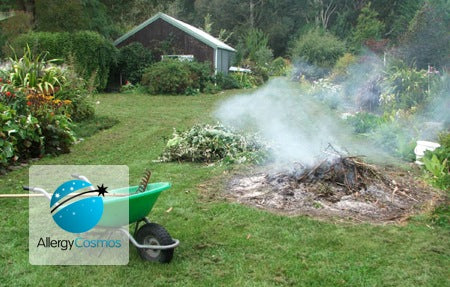The summer season is almost upon us and that means (weather permitting) barbeques, working in the garden – and possible self-made outdoor air pollution, which can severely affect people with asthma and allergies. Burning (combustion) of any kind, indoors or outdoors, produces nitrogen oxides, carbon monoxide and particulate pollution. Charcoal, wood, and garden rubbish are all 'dirty' fuels that emit ample pollutants when they are burned. In short, outdoor pollution doesn't just come from vehicle exhausts – it can also arise from summer activities. So follow these tips to have fun, while not triggering asthma attacks or exacerbating heart or lung problems through exposure to air pollution.
- Use propane, natural gas or natural charcoal as fuel for a less polluting barbeque.
- Cancer research organisations warn that barbequing meat, poultry and fish produces polyaromatic hydrocarbons (PAHs), which are known carcinogens. When fat drips onto the hot coals, PAHs enter the smoke and you breathe them in. Marinading before grilling cuts the amount of PAHs in smoke significantly – it is thought that citrus juices, wine or vinegar in a marinade mix form a barrier of some kind. So don't BBQ raw meat, fish, or chicken – stick it in a tasty marinade first.
- Keep a constant eye on the barbeque. Turn meat frequently to prevent 'flaring' which produces bursts of pollutant-laden smoke into the atmosphere
- Barbeque at a lower temperature, aiming for a roast rather than a grill. This releases fewer cancer-causing pollutants into the air.
- Having an occasional bonfire for a celebration is probably OK. However, burn only dry material as any dampness will produce more polluting smoke. Also, piling up damp wood and leaves will increase the number of mould spores in the air, potentially triggering allergies.
- Most garden waste can be recycled either by composting or removing it from your garden using the Council's 'green waste' collection. Do this, rather than getting into the habit of regularly burning garden rubbish.
- Remember, in the United Kingdom it is an offence under the Environmental Act to burn domestic rubbish in such a way as to cause pollution or harm to human health. Never add plastic or rubber materials to a bonfire as the resulting fumes can trigger an asthma attack and hurt anyone with an existing heart or lung problem. It is also an offence to create so much smoke that it endangers visibility for traffic on a nearby road.
For the best air cleaners visit our Air Purifier Shop today.




